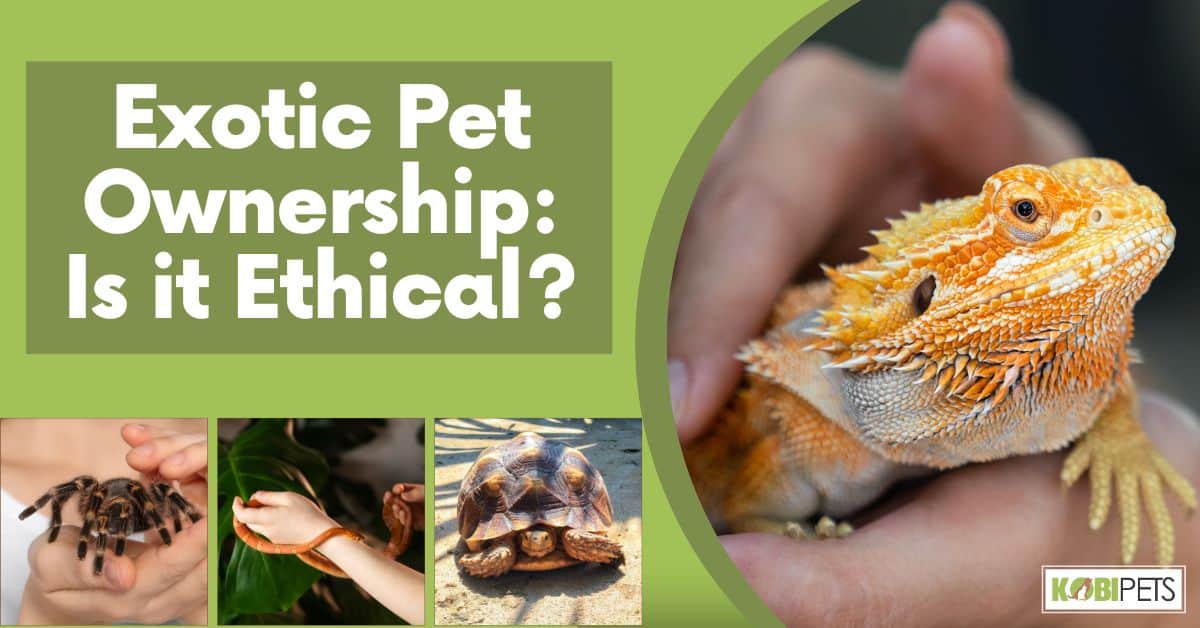
Exotic pet ownership has become increasingly popular in recent years, with a variety of species being kept as companions in homes around the world. But owning an exotic pet comes with its own unique set of ethical concerns and responsibilities.
In this article, we’ll delve into the history and current trends of exotic pet ownership, discuss the pros and cons, explore the ethical implications, and outline regulatory legislation related to exotic pets. We’ll also provide an overview of responsible care for exotic animals so that pet owners can make informed decisions about their choices.
What are Exotic Pets?
Exotic pets are animals that are not typically kept as domestic pets, such as cats, dogs, or birds. These animals are often native to other countries or continents and are not commonly found in domestic households. Examples of common exotic pets include:
- Reptiles such as snakes, lizards, and turtles
- Mammals such as ferrets, hedgehogs, and sugar gliders
- Birds such as parrots, macaws, and cockatiels
- Fish such as exotic species of tropical fish and saltwater fish
- Amphibians such as frogs and salamanders
- Arthropods such as tarantulas, scorpions, and millipedes
- Some exotic pets are also considered to be wild animals, such as big cats, monkeys, and bears.
These animals are illegal to own as pets in many places and require specific permits, special care, and facilities. Exotic pets can be obtained through various means, such as breeding facilities, pet stores, or private breeders. However, some exotic animals are also obtained through illegal means, such as poaching or illegal animal trade.
Exotic pets can pose unique challenges for pet owners. Some exotic animals require specialized care and diet, and may not be suitable for all households. Additionally, some exotic animals can grow quite large and may not be suitable for living in a domestic environment.

The Popularity of Exotic Pets
Exotic pets have become increasingly popular in recent years. The allure of owning an unusual or unique animal can be quite appealing to some people. Additionally, the internet has made it easier to research and purchase exotic pets, which has led to an increase in demand. Many people find exotic pets to be fascinating and enjoy learning about their unique characteristics and behaviors.
Reptiles, such as snakes and lizards, have become particularly popular as exotic pets in recent years. These animals are relatively low maintenance and can be kept in small spaces, making them suitable for people with limited living quarters. Birds, such as parrots, are also popular exotic pets, as they can be quite intelligent and can be trained to do a variety of tricks.
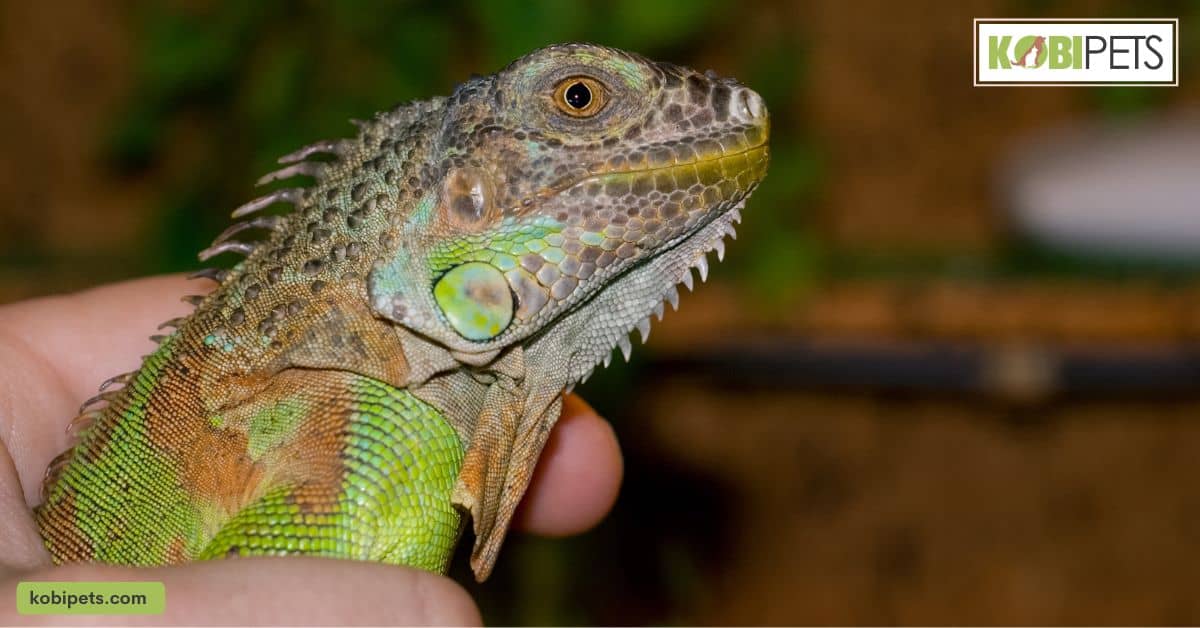
Pros and Cons of Exotic Pet Ownership
Exotic pet ownership has both pros and cons. On one hand, owning an exotic pet can be a rewarding and enjoyable experience, but on the other hand, it can also pose challenges and ethical concerns.
| PROS | |
| Companionship | Many people find exotic pets to be fascinating and enjoy learning about their unique characteristics and behaviors. They can be great companions and provide emotional benefits to their owners. |
| Educational Opportunities | Exotic pets can be a great way to learn about different cultures and different parts of the world. They can also be a great educational tool for children and families, teaching about conservation, animal behavior, and natural history. |
| Conservation Efforts | Some exotic pets are endangered in the wild, and breeding them in captivity can help to preserve their species. |
| CONS | |
| Inadequate Living Conditions |
Many exotic pets have specific needs that must be met in terms of housing, temperature, diet, and socialization. These needs are often not met in captivity, resulting in poor living conditions and potential health problems.
|
| Health Risks |
Some exotic pets can carry diseases that can be transmitted to humans, and some exotic pets also pose a risk to humans if not properly handled.
|
| Illegal Trade and Poaching |
The trade of exotic animals is often illegal, and many animals are captured from the wild in cruel and inhumane ways.
|
| Ethical Concerns |
Keeping wild animals in captivity raises ethical concerns about the animal’s welfare and the impact on their natural habitat.
|
Overall, owning exotic pets can be a rewarding and enjoyable experience, but it’s important to be aware of the potential challenges and ethical concerns before making a decision.
Ethical Concerns Surrounding Exotic Pet Keeping
Ethical concerns surrounding exotic pet keeping refer to the moral implications of keeping wild animals in captivity. These concerns are centered around the welfare of the animals, the impact of captivity on the natural behavior of the animals, the impact on wild populations, and the human responsibility of keeping exotic pets.
The welfare of the Animals
Exotic pets often have specific needs that must be met in terms of housing, temperature, diet, and socialization. These needs may not be met in captivity, resulting in poor living conditions and potential health problems for the animal. This can lead to a reduced quality of life for the animal, which is considered unethical by many animal welfare organizations.
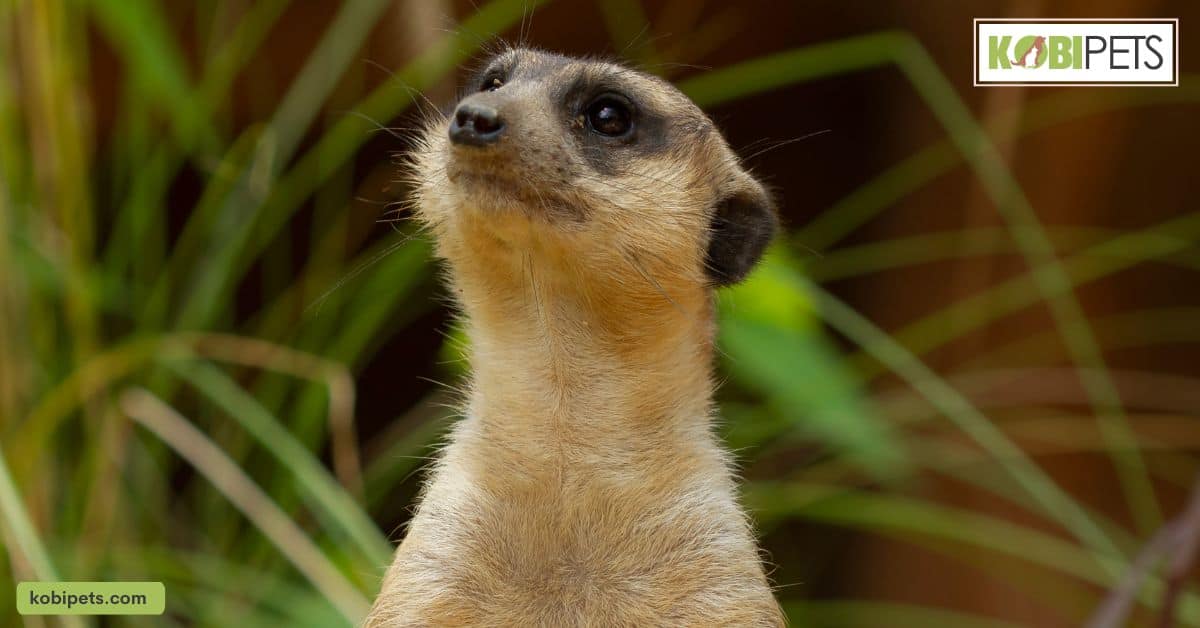
Impact of Captivity on the Natural Behavior of the Animal
Many exotic animals are not adapted to living in captivity and may experience stress and anxiety as a result. This can lead to abnormal behaviors, such as self-harm or aggression, which can also be considered unethical.
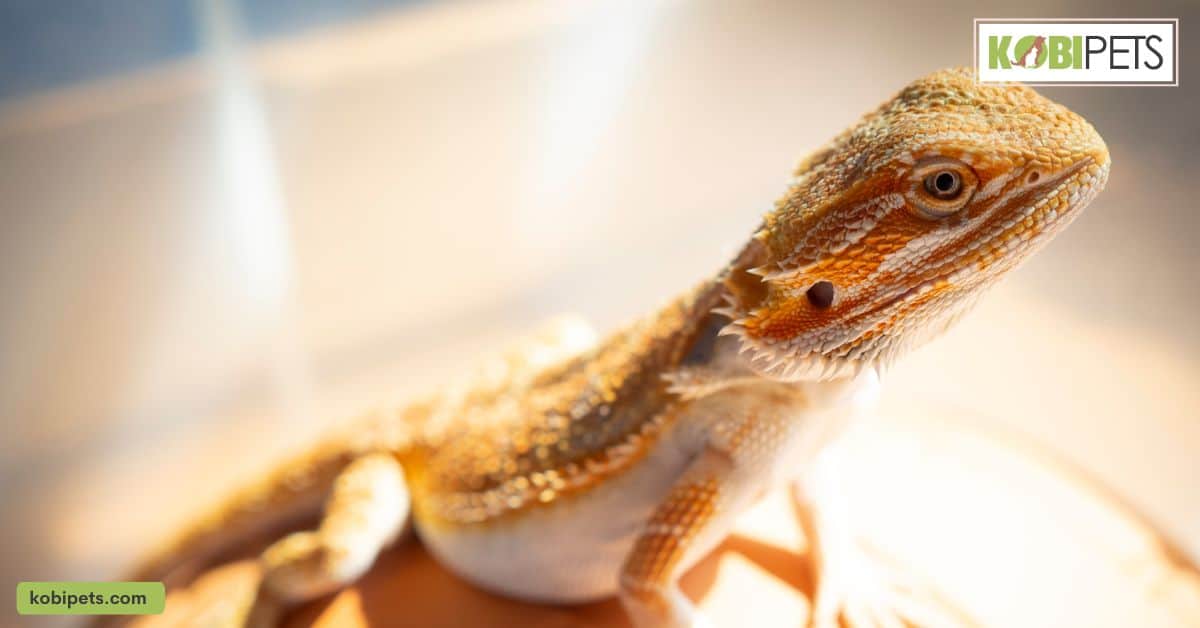
Exotic pet keeping on wild populations
Many exotic animals are captured from the wild, often through illegal means such as poaching. This can have a detrimental impact on wild populations, leading to a decrease in numbers and a potential loss of genetic diversity.
Additionally, there is a concern about people keeping wild animals as pets that they may not have the capability to provide them with the appropriate care and attention, which can lead to neglect or abuse.
It is also important to consider the ethical implications of keeping wild animals in captivity, away from their natural habitat and way of life, for human entertainment or companionship.
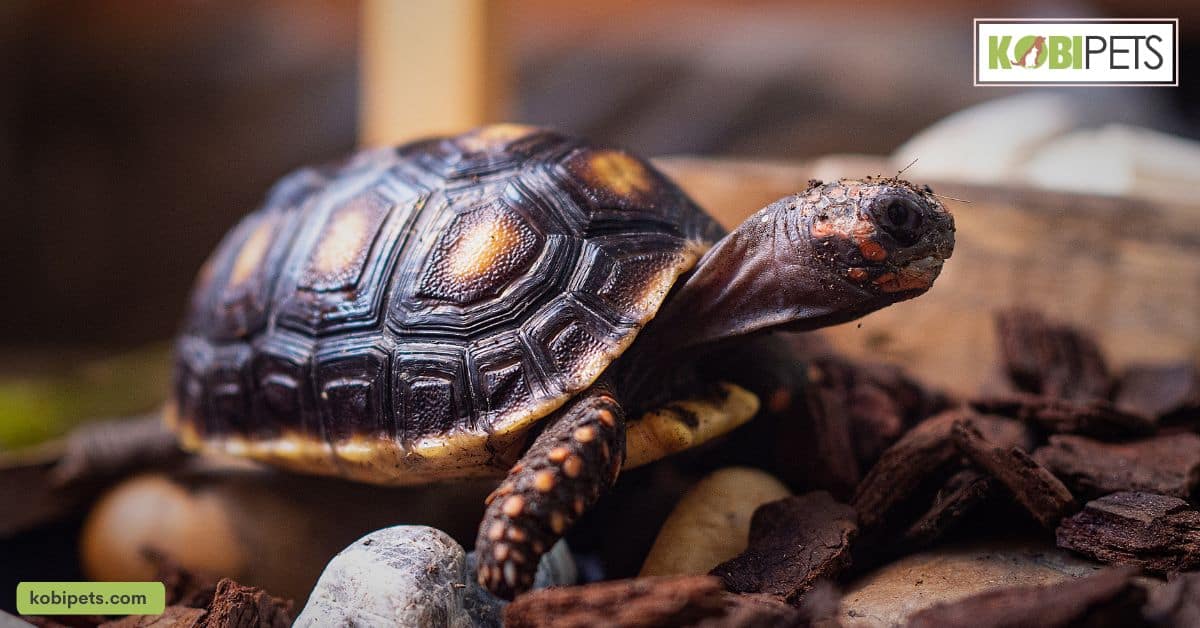
Legislation Related to Exotic Pet Ownership
Legislation related to exotic pet ownership varies by country and by state. In general, the laws governing exotic pet ownership are in place to protect both the animals and the public.
In the United States, individual states have the authority to regulate exotic pet ownership. Some states have laws that prohibit or restrict the possession of certain exotic animals, while others have laws that require specific permits or licenses for certain animals. The federal government also regulates the import and export of exotic animals through the Lacey Act and the Endangered Species Act.
In the United Kingdom, the Dangerous Wild Animals Act 1976 regulates the keeping of certain wild animals as pets. The act requires that individuals who wish to keep certain wild animals as pets must have a license issued by their local authority.
In Canada, the possession of exotic animals is regulated by the provinces and territories. Each province and territory has its own legislation regarding exotic pet ownership, and some have laws that prohibit or restrict the possession of certain exotic animals.
In Australia, the keeping of exotic animals as pets is regulated by the state and territory governments. Each state and territory has its own laws regarding exotic pet ownership, and some have laws that prohibit or restrict the possession of certain exotic animals.
It’s important to note that laws and regulations related to exotic pet ownership can change over time, so it’s advisable to stay informed and comply with the current laws and regulations in your area.
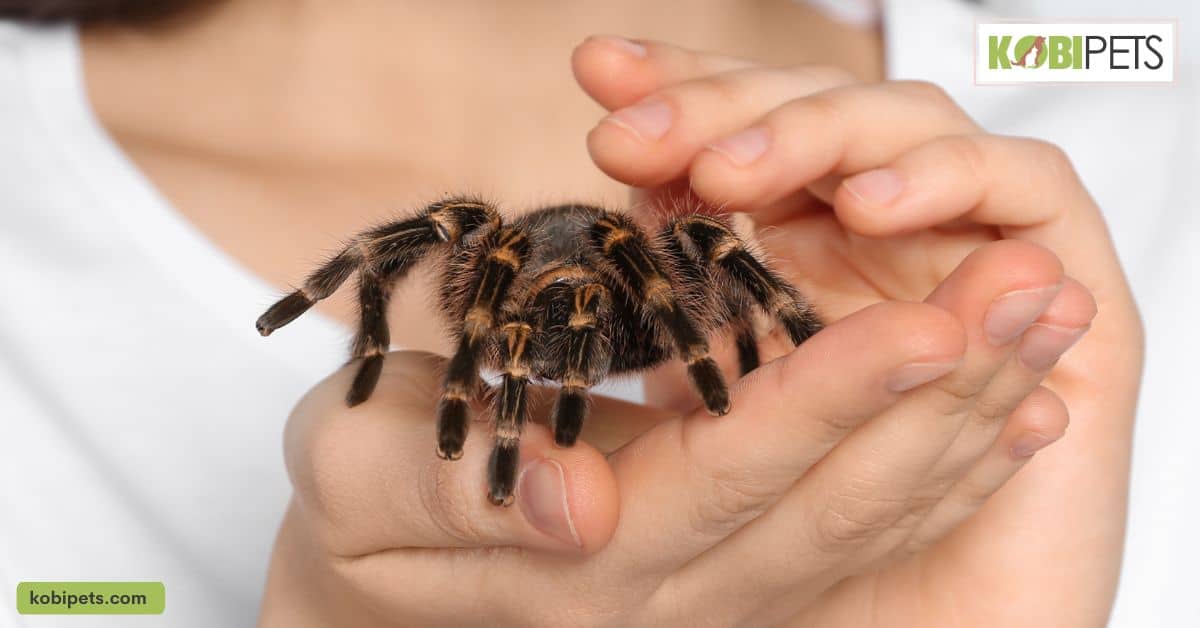
Understanding Responsible Care for Exotic Pets
Providing responsible care for exotic pets involves several important steps. Here is a list of how to provide responsible care for exotic pets:
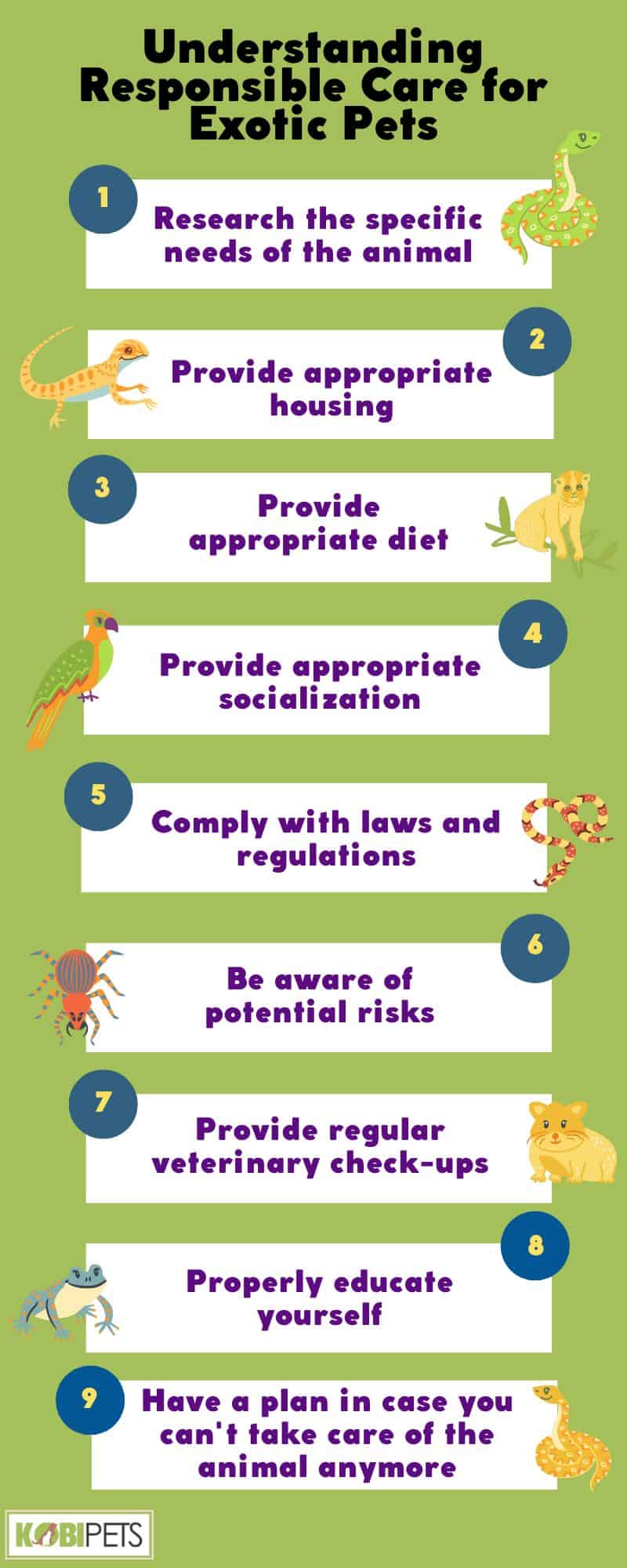
Understanding Responsible Care for Exotic Pets
Research the specific needs of the animal
Learn about the animal’s natural habitat, diet, behavior, and socialization needs. This will help you to provide the animal with appropriate care and a suitable living environment.
Provide appropriate housing
Ensure that the animal has a suitable living space that meets its specific needs, such as appropriate temperature, humidity, and lighting.
Give appropriate diet
Give the animal a diet that meets its nutritional needs, and ensure that the animal receives regular veterinary check-ups and medical care.
Provide proper socialization and enrichment
Provide the animal with opportunities to engage in natural behaviors, such as climbing, foraging, and interacting with others of its own kind.
Comply with laws and regulations
Be aware of and comply with the laws and regulations related to exotic pet ownership in your area. This includes obtaining any necessary permits or licenses and being aware of any restrictions or prohibitions on the possession of certain exotic animals.
Be aware of potential risks
Be aware of the potential risks to both the animal and the public, such as the potential for disease transmission, and take appropriate measures to mitigate these risks.
Provide regular veterinary check-ups
Regular veterinary check-ups will help ensure the animal’s health and well-being.
Properly educate yourself
roper education on the species, its needs, and how to handle it is important, this will help you to make an informed decision and provide the animal with the best possible care.
Have a plan in case you can’t take care of the animal anymore
It’s important to have a plan in place in case you are unable to take care of the animal anymore, whether it’s due to a change in circumstances or the animal’s death.
Overall, providing responsible care for exotic pets requires proper research, education, and planning. It’s important to do proper research and make an informed decision before considering exotic pet ownership, and to provide the animal with appropriate care and attention once it’s part of the household.
The Future of Exotic Pet-Keeping Regulations
The future of exotic pet-keeping regulations is likely to continue to evolve in order to better protect the welfare of animals and the safety of the public. Some possible regulations that may be implemented in the future include:
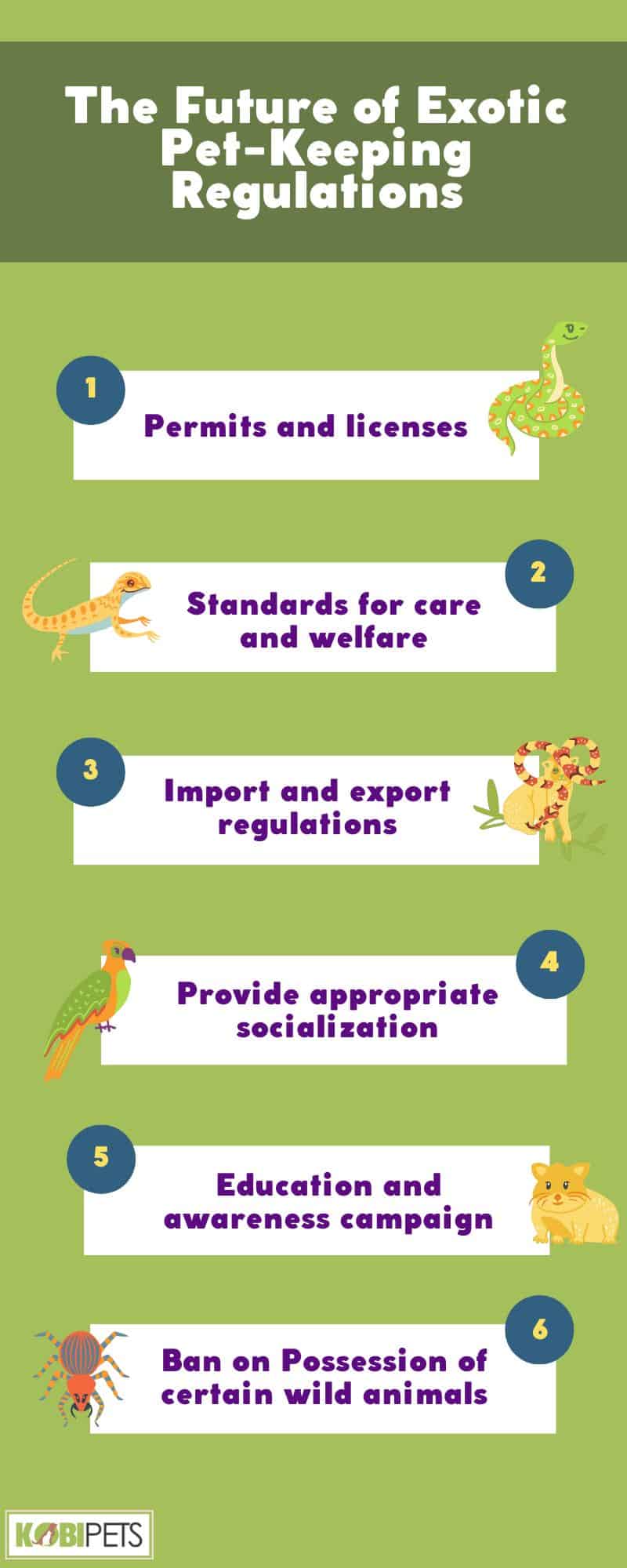
The Future of Exotic Pet-Keeping Regulations
Prohibitions or restrictions on certain exotic animals: Laws that prohibit or restrict the possession of certain exotic animals, such as big cats, primates, and certain species of reptiles, will become more common in the future to protect the welfare of the animals and the safety of the public.
Permits and licenses
More states and countries may require specific permits or licenses for certain exotic animals, which will ensure that individuals who wish to keep exotic pets are properly educated and equipped to provide the animals with appropriate care.
Standards for care and welfare
Regulations may be put in place to establish standards for the care and welfare of exotic animals in captivity, such as mandatory veterinary check-ups and inspections of facilities.
Import and export regulations
Stricter regulations on the import and export of exotic animals may be implemented in order to prevent the illegal trade of exotic animals and the impact of poaching on wild populations.
Education and awareness campaign
Governments may invest in education and awareness campaigns to inform the public about the ethical and welfare issues surrounding exotic pet ownership and the importance of conservation.
Ban on Possession of certain wild animals
As more research is done on the impacts of captivity on wild animals’ welfare, it’s expected that more countries will start to ban the possession of certain wild animals as pets, and instead promote conservation efforts.
Overall, the future of exotic pet-keeping regulations is likely to continue to evolve in order to better protect the welfare of animals and the safety of the public. It’s important to stay informed and comply with the current laws and regulations in your area.
In Conclusion
Owning an exotic pet can be a rewarding and enjoyable experience, but it’s important to be aware of the potential challenges and ethical concerns before making a decision. Regulations related to exotic pet ownership vary by country and state, so it’s important to stay informed and comply with the current laws and regulations in your area.
Additionally, providing responsible care for exotic pets requires proper research, education, and planning. Understanding the needs of the animal, providing appropriate housing, diet, socialization, and enrichment opportunities, as well as complying with laws and regulations and being aware of potential risks will help ensure that your exotic pet receives the best possible care.






